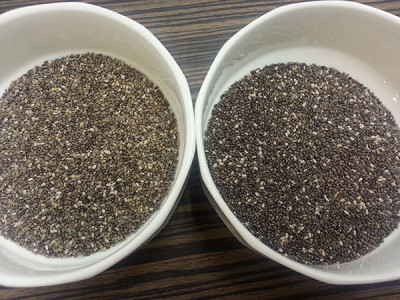-
No products in the cart.
How Chia Seeds Improve Cholesterol, Diabetes and Hypertension?

Singapore is facing a growing wave of chronic health conditions driven largely by lifestyle choices, particularly poor dietary habits and sedentary routines. Today, based on data from the 2021–2022 National Population Health Survey, over 12% of adults live with diabetes, nearly 40% battle high cholesterol, and more than a third suffer from hypertension. These are alarming statistics. Contributing factors include the widespread consumption of ultra-processed and high-sodium foods, sugary beverages, and a general lack of fiber-rich, nutrient-dense options in daily meals. These conditions should not be just statistics—they reflect a deeper need for sustainable dietary shifts and health-conscious living to combat what’s becoming a national health crisis.
Key components of a gradual yet meaningful shift of dietary patterns should include a move toward whole foods over ultra-processed ones, increased consumption of fiber-rich whole grains, fruits, vegetables, and legumes/beans, as well as plant-based proteins like tofu, tempeh, chia seeds, or lean meat proteins.
One particular whole food we are highlighting today is Organic Chia seeds. Chia seeds contain 16 percent protein, 31 percent good fat, and 44 per cent complex carbohydrate of which 38 percent is fibre. Most of chia seed’s fats are the essential omega-3 fatty acids, alpha-linolenic acid (ALA) – these fats are good and vital for health. The body cannot produce these essential fatty acids and therefore must be derived from diet.
According to research by Dr Luc Djousse of Harvard University, the consumption of Omega 3 fatty acids appeared to protect against diabetes. The doctor had suggested that omega-3s — and particularly ALA — might improve body cells’ sensitivity to insulin, the hormone that regulates blood sugar.
In this blog, we’ll discuss how adding Chia seeds to your diet can help regulate high blood pressure, diabetes, and improve Cholesterol profile.
How Do Organic Chia Seeds Help Improve Cholesterol Profile and Diabetes Issues?
Chia seeds are hydrophilic in nature, meaning they can absorb water many times their own weight. So when you consume organic chia seeds that have been soaked in water/liquid, they form a viscous gel, and this retards the processing of food in the body. This in turn regulates food absorption and slows down the conversion of carbohydrates to simple sugars, an essential factor in the control of blood sugar.
Insulin Resistance
The key benefit of chia seeds is their ability to control insulin resistance. Insulin is the hormone that transports the sugar (glucose) from the blood into the muscles and the liver where it can be utilised by the body as fuel. With the insulin level in check, the sudden spikes in glucose levels are evened out, stabilising the metabolism. Since the release of sugar is now controlled, you feel fuller and more energetic for a longer period of time, thereby reducing food cravings.
Helps Improve Heart Health & Cholesterol
A lot of people suffering from diabetes also have high blood pressure and an increase in cholesterol levels, a precursor to cardiovascular disease. Eating chia seeds provides your body with a healthy dose of Omega 3 ALA, alpha-linolenic acid. This fatty acid helps prevent the deposit of cholesterol in the arteries, which can lead to atherosclerosis, and reduce the liver’s production of triglycerides, thus improving fat metabolism. Additionally, Omega 3 Alpha-linolenic acid (ALA) helps relax blood vessels, reduce inflammation, and improve circulation—these are key factors in lowering blood pressure.
Chia seeds are also rich in soluble fiber, particularly mucilage, which forms a gel-like substance when mixed with water. This gel can bind to cholesterol and bile acids in the digestive tract, helping to carry them out of the body before they’re reabsorbed. As a result, it can contribute to lowering LDL (“bad”) cholesterol levels. In short, consuming chia seeds regularly can lead to lesser amounts of fat accumulation in the body by keeping a check on the level of triglycerides and cholesterol.
Aids in Type 2 Diabetes
A majority of people who deal with diabetes suffer from type 2 diabetes, and it is more commonly seen in overweight people. Adding chia seeds to the diet is an excellent way to manage and lose weight. Being rich in dietary fibre and with their tendency to retain water, they fill you up faster and suppress your appetite for unhealthy snacks. Unlike other grains, even a small amount of chia seeds provides your body with enough fibre for a day. Hence, including organic chia seeds is beneficial, especially for diabetics, as just eating a small quantity of fibre-rich food on a daily basis can aid in your weight loss efforts.
Conclusion
With so many health benefits, it’s hardly any wonder that these tiny chia seeds in Singapore are the rage now in many health-conscious communities. But you should be aware that eating chia seeds alone cannot fight diabetes. Treating diabetes means making a lot of adjustments to your lifestyle and food habits. It is equally important to follow all medication as advised by your doctor, cut down on ultra-processed foods or empty-calorie foods that are so prevalent in our modern diet, and exercise on a regular basis.
The addition of chia seeds to your daily diet, however, can support you on your journey toward managing hypertension, diabetes and cholesterol levels. You can eat them in a variety of convenient ways, by adding them to water, juices, beverages and even soups. It’s a powerhouse of nutrients and incorporating this superfood into your daily diet can definitely bring about a positive change in your overall long-term health.
If you are consuming Organic Chia Seeds regularly, let us know how Chia Seeds have helped to boost your health! Just post a comment below.

